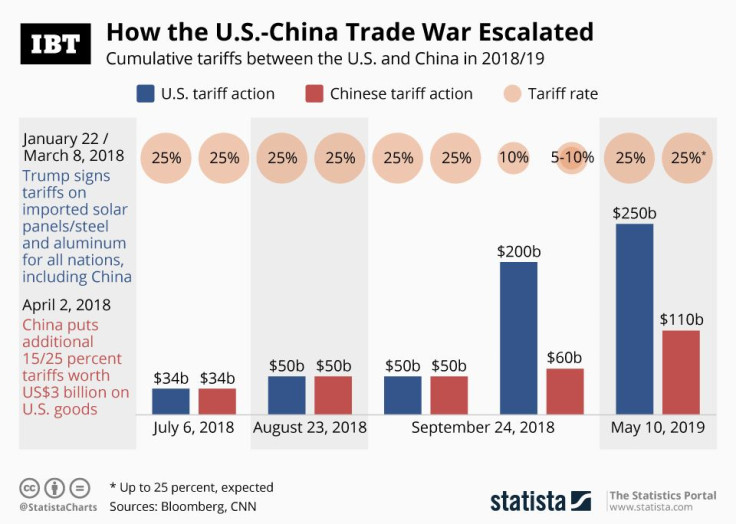US-Mexico Relations: Democrats, Republicans Find Fault In Trump's Tariffs To Address Southern Border Immigration

President Donald Trump’s threat Thursday of escalating tariffs on all Mexican goods as long as immigration at the U.S.-Mexico border remains a problem sent shockwaves through both countries and on both sides of the congressional aisle.
Starting as early as June 10, a 5% across-the-board tariff on Mexican goods will escalate to as high as 25% by October if immigrants fleeing poverty and violence in a number of Central American countries and Mexico continue seeking asylum in the U.S.
Mexico’s economy already is shrinking, and forecasts peg growth in 2019 at less than 1%, the worst performance in a decade. The U.S. has roughly a $72 billion trade deficit with Mexico and raising costs on Mexican goods will impact America’s auto industry, among others. Auto stocks were down on Friday after the tariff announcement.
Sen. Chuck Grassley, R-Iowa, called Trump’s plan a “misuse of presidential tariff authority," while Sen. Gary Peters, D-Mich., said he is “concerned about the impact of the president’s proposal on Michigan workers and our auto industry" and noted that it was unclear how it would strengthen border security.
Mexico is the second largest Latin American economy, behind Brazil, and exports $372 billion of goods to the U.S. The president increasingly has used tariffs to extract economic concessions from China, Europe, Canada and Mexico. In early May, Trump imposed tariffs on $200 billion of Chinese goods entering the U.S., and last week rolled back tariffs on steel and aluminum between Canada and Mexico.
.@realDonaldTrump’s threat to place tariffs on Mexico is not rooted in wise trade policy but has more to do with bad immigration policy on his part. Read my full statement here:https://t.co/5mDDvR80xu
— Nancy Pelosi (@SpeakerPelosi) May 31, 2019
Bloomberg economist Felipe Hernandez has said tariffs on Mexican goods could drive the NAFTA trading partner into recession, given its high exposure to trade with the U.S. About 80% of Mexican exports go to the U.S.
The stock market Friday closed down 354.84 points, continuing a monthlong slide that’s shaved 6% from the S&P 500, along with telegraphing signs in bond markets of a potential global recession.
Several Republican lawmakers, who rarely challenge the president, said tariffs were the wrong tool to reign in illegal immigration. Robert Lighthizer, the president’s top trade representative, raised concern over the move.
'Blindsided' Republicans push back against tariffs @CNNPolitics https://t.co/clFxl0zvaG
— alice armstrong (@alicear05377416) June 1, 2019
Mexico President Andrés Manuel Lopez Obrador said his country did not want a confrontation with the U.S. and was doing what it could to limit migration north “without violating human rights,” the New York Times reported.
A Mexican delegation is traveling to Washington this week to meet with Secretary of State Mike Pompeo and others, “to find a dialogue with a lot of diplomacy,” Lopez Obrador wrote in a letter to President Trump on Thursday. The two leaders have not spoken directly since Trump announced the proposed tariffs.
NAFTA went into effect on January 1, 1994, and since has interwoven the economies of Canada, the U.S., and Mexico through the borderless exchange of manufactured goods that supply a variety of industries. Henio Arcangeli, Honda’s head of American operations, said the tariffs potentially could price out some Americans from purchasing new cars, given auto prices already are at record highs.
The move could reduce the likelihood of passing the USMCA, a trade deal between the United States, Mexico and Canada https://t.co/1Nq40ZRGHX
— The Economist (@TheEconomist) June 1, 2019
Mexico supplies roughly 70% of the wiring harnesses used in auto manufacturing in the U.S. for such brands as Toyota, Honda, Mercedes Benz and Hyundai.
Pulitzer Prize-winning automotive journalist Paul Ingrassia told CNBC, “Tariff equals tax hike.”
© Copyright IBTimes 2024. All rights reserved.





















